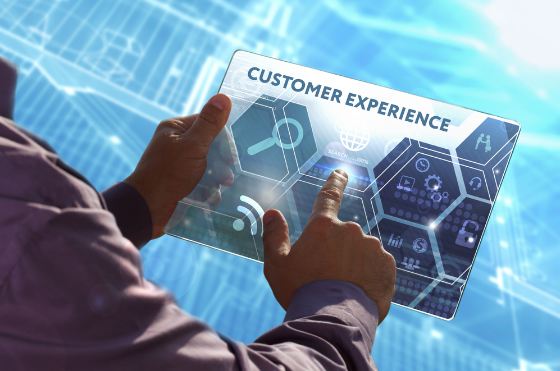Startup
CXInfinity – What is a Platform and Digital Customer Service Experience?

Digital Experience Platform (DXP) is an emerging category of business software aimed at supporting businesses in their digital transformation and creating better customer experiences. These Digital Omnichannel Customer Engagement provide companies with architecture to better understand their customers through relevant information and metrics, digitize their business operations, and deliver consistent customer experiences regardless of the channel.
DXPs are trying to solve a big problem: customer obsession
In the digital age, many factors have forced companies to reinvent their business model and adopt a customer-oriented strategy:
- Digital channels (web, mobile and social networks) have become the preferred means of interaction for customers
- These customers expect to live a unique digital experience as offered by Google, Apple, or Facebook
- Social media, in particular, allow customers to influence public opinion about a particular business
- Mobile devices provide geolocation and instantaneity to help businesses stay in touch with customers
- Visibility into customer data offers the means to segment your audience and create a highly personalized experience.
- Platform and Digital Customer Service Experience allows new players such as Airbnb, Uber, or even Netflix to disrupt traditional markets while offering a better customer experience.
As you can see, digital technologies contribute to both the risks (e.g. launching a start-up) and the opportunity (digital transformation) that businesses face.
Understanding the market: digital experience platforms come from legacy categories
Most products being positioned as DXPs have their roots in one of three categories: Content Management Systems, Portal Servers, and Commerce Servers. These roots give each set of offerings a particular orientation:
DXPs inherited from a CMS are more dedicated to the needs of marketing teams and communication agencies. The customer data collected tends to be anonymous and generalized into audience segments. Thus, these platforms mainly meet the need for customer acquisition: making the brand known, offering targeted offers, and speeding up the purchasing process. They are very successful, particularly in the B2C sector (retail, fashion) where the sales cycle is short and the public is larger.
The best platforms on the market offer important functionalities such as web analytics, customer segmentation, advertising, or emailing campaigns. These campaigns are often offered by the products of a suite (probably acquired from other suppliers) and can thus be more or less well integrated with each other.
Some of these platforms have attempted to add portal functionalities such as personalized access or even integrate e-commerce functionalities often the result of an acquisition or a partnership.
The digital experience platforms inherited from a portal dedicated to setting up customer-type portals are particularly suitable for maintaining long-term customer relationships after the sale. Customer data is specific to each individual and is handled securely. These platforms allow businesses to understand the factors that facilitate customer retention. They can help in the calculation of well-known metrics like the Net Promoter Score. In addition, they are often used as part of customer service, for problem-solving independently or assisted by an advisor.
Digital experience platforms inherited from a portal are also suitable for digital workspace scenarios. Traditionally, this is about the intranet, although digital workspace solutions need to be much more dynamic and engage. These platforms are also suitable for engagement and support scenarios for partners, suppliers, and franchisees. A global digital transformation strategy can thus cover these different scenarios.
According to CXInfinity experts, quality Digital Customer Experience platforms must also offer high-level integration, as it is essential for a successful digital transformation of business activities. Managing reusable services and modules is useful when the strategy is changing rapidly.
Some digital experience platforms inherited from a portal include a broad set of features, including content management, audience targeting, mobile support, workflows, and forms. Others may focus primarily on the presentation layer.
Legacy retail digital experience platforms are used in online shopping scenarios by companies in the retail industry and related industries. In addition to providing product-related content on e-commerce-like web interfaces, these platforms also provide capabilities for inventory management, shopping cart, payments, and their integration, as well as satisfaction. Although these features are not exclusively related to digital experience management, it is clear that a quality customer experience requires a smooth integration with these features.
-

 Business2 weeks ago
Business2 weeks agoArdavon Moayer Explains How Discipline and Teamwork Translate to Sales Wins
-

 Cryptocurrency2 weeks ago
Cryptocurrency2 weeks agoRami Beracha Asks, Can Israel Become A Global Leader In Blockchain Innovation?
-

 Business1 week ago
Business1 week agoRandy NG: Inside the Process of Managing End-to-End International Trade Operations
-

 Tech4 weeks ago
Tech4 weeks agoAdsPower Promo Code for 50% Off – Ultimate Guide to AdsPower Benefits (Referral Code Included)
-

 Education3 weeks ago
Education3 weeks agoForged in Fire: Nicholas Lawless Unveils Lawless Leadership – The Model Built for a World That Traditional Leadership Can’t Survive
-

 Business3 weeks ago
Business3 weeks agoOPO Group LTD Strengthens Its Global Footprint With Expanding Offices and a Modernized Trading Ecosystem
-

 Tech1 week ago
Tech1 week agoFrontier Galvanizing: The Critical Role Of Galvanizing In Renewable Energy And Utility Projects
-

 Business4 weeks ago
Business4 weeks agoThe overlooked costs of working from home








